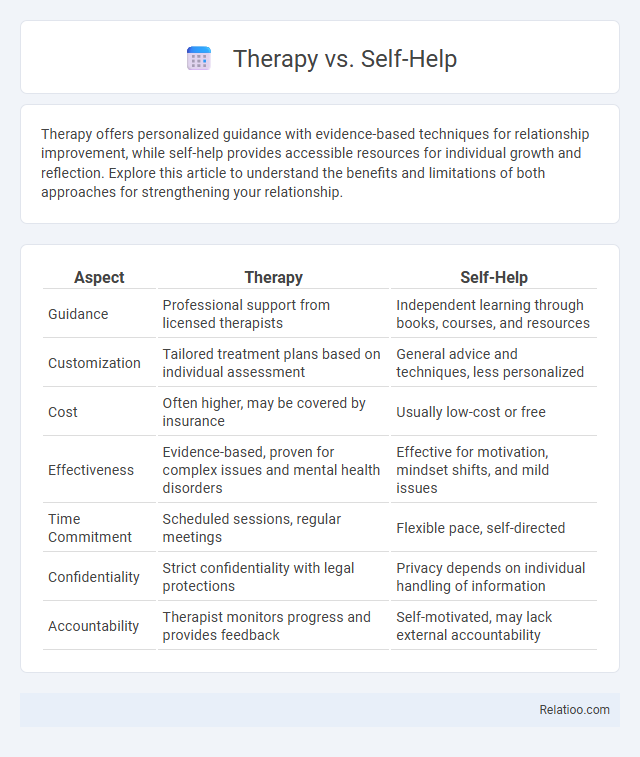Therapy offers personalized guidance with evidence-based techniques for relationship improvement, while self-help provides accessible resources for individual growth and reflection. Explore this article to understand the benefits and limitations of both approaches for strengthening your relationship.
Table of Comparison
| Aspect | Therapy | Self-Help |
|---|---|---|
| Guidance | Professional support from licensed therapists | Independent learning through books, courses, and resources |
| Customization | Tailored treatment plans based on individual assessment | General advice and techniques, less personalized |
| Cost | Often higher, may be covered by insurance | Usually low-cost or free |
| Effectiveness | Evidence-based, proven for complex issues and mental health disorders | Effective for motivation, mindset shifts, and mild issues |
| Time Commitment | Scheduled sessions, regular meetings | Flexible pace, self-directed |
| Confidentiality | Strict confidentiality with legal protections | Privacy depends on individual handling of information |
| Accountability | Therapist monitors progress and provides feedback | Self-motivated, may lack external accountability |
Understanding Therapy and Self-Help
Therapy offers personalized professional guidance to address deep-rooted psychological issues, providing a structured environment for mental health improvement. Self-help involves individual-driven strategies like books and online resources aimed at fostering self-awareness and coping mechanisms. Understanding the distinct roles of therapy and self-help is crucial for effectively managing trauma and promoting long-term emotional resilience.
Key Differences Between Therapy and Self-Help
Therapy involves a licensed professional guiding you through personalized treatment plans based on psychological principles and evidence-based practices, while self-help relies on individual effort through books, videos, or workshops without professional oversight. Therapy provides a confidential and structured environment to address trauma, allowing for tailored interventions that self-help resources cannot match. Your progress in therapy is monitored and adapted by clinicians, ensuring targeted healing rather than the generalized advice typical in self-help methods.
Benefits of Professional Therapy
Professional therapy offers evidence-based techniques tailored to your unique psychological needs, ensuring accurate diagnosis and effective treatment of trauma-related issues. Trained therapists provide a safe, confidential environment to explore complex emotions and develop coping strategies that self-help methods often lack. Engaging in therapy can accelerate healing and improve mental health outcomes, surpassing the generalized guidance found in self-help resources.
Advantages of Self-Help Approaches
Self-help approaches empower individuals by providing accessible, cost-effective tools to manage mental health challenges and promote personal growth. These methods allow for flexible pacing and personalized strategies, enhancing adherence and self-efficacy compared to traditional therapy. Techniques such as mindfulness, journaling, and self-guided cognitive behavioral exercises offer practical benefits in trauma recovery by fostering emotional regulation and resilience.
When to Choose Therapy Over Self-Help
Choosing therapy over self-help is crucial when trauma symptoms persistently disrupt daily life, causing intense emotional distress or functional impairment. Professional therapy provides tailored interventions such as cognitive-behavioral therapy (CBT) or Eye Movement Desensitization and Reprocessing (EMDR) that effectively address complex trauma beyond the scope of self-help strategies. Individuals experiencing flashbacks, severe anxiety, or depressive episodes linked to trauma benefit significantly from licensed therapists trained to navigate deep psychological challenges safely.
Common Types of Therapy Modalities
Cognitive-behavioral therapy (CBT), dialectical behavior therapy (DBT), and eye movement desensitization and reprocessing (EMDR) are common therapy modalities effectively used to address trauma and mental health challenges. Your choice between therapy and self-help depends on the severity of symptoms and the need for professional guidance or structured approaches. While self-help offers accessible tools and coping strategies, therapy provides tailored interventions from licensed practitioners to promote lasting recovery.
Popular Self-Help Techniques and Resources
Popular self-help techniques include mindfulness meditation, cognitive-behavioral exercises, and journaling, which empower you to manage stress and promote emotional healing independently. Resources such as self-help books by experts like Dr. Brene Brown, mobile apps like Headspace, and online support communities provide accessible tools for personal growth. While these methods support trauma recovery, therapy remains essential for deep, individualized treatment of complex trauma.
Cost and Accessibility Comparison
Therapy often involves higher upfront costs, with average session fees ranging from $75 to $250, and may require insurance or sliding scale options for affordability, whereas self-help resources like books, apps, and online courses generally offer more budget-friendly access, sometimes free or under $50. Trauma-specific therapy can be even more costly due to specialized training required by providers, while self-help lacks personalized guidance but improves accessibility for individuals in remote or underserved areas. Accessibility barriers for therapy include appointment availability and geographic location, whereas self-help materials allow immediate, on-demand use yet might not address complex trauma effectively.
Combining Therapy and Self-Help for Optimal Growth
Combining therapy and self-help techniques enhances emotional healing by providing personalized guidance alongside effective coping strategies. Evidence-based approaches such as cognitive-behavioral therapy combined with mindfulness practices empower individuals to address trauma symptoms more comprehensively. Integrating professional support with self-directed growth accelerates resilience and long-term mental health improvements.
Making the Right Choice for Your Mental Health
Choosing between therapy, self-help, and trauma-focused approaches depends on the severity and nature of mental health challenges. Therapy provides professional guidance and evidence-based techniques essential for processing complex trauma, while self-help offers accessible tools for managing mild stress and fostering resilience. Prioritizing personalized care by assessing symptoms, available resources, and desired outcomes ensures the most effective path to mental wellness.

Infographic: Therapy vs Self-Help
 relatioo.com
relatioo.com